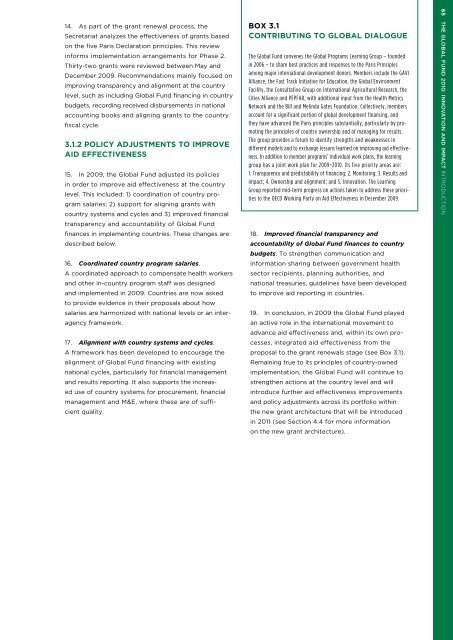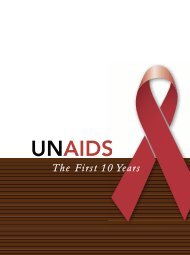Global Fund: Progress Report 2010 - unaids
Global Fund: Progress Report 2010 - unaids
Global Fund: Progress Report 2010 - unaids
You also want an ePaper? Increase the reach of your titles
YUMPU automatically turns print PDFs into web optimized ePapers that Google loves.
14. As part of the grant renewal process, the<br />
Secretariat analyzes the effectiveness of grants based<br />
on the five Paris Declaration principles. This review<br />
informs implementation arrangements for Phase 2.<br />
Thirty-two grants were reviewed between May and<br />
December 2009. Recommendations mainly focused on<br />
improving transparency and alignment at the country<br />
level, such as including <strong>Global</strong> <strong>Fund</strong> financing in country<br />
budgets, recording received disbursements in national<br />
accounting books and aligning grants to the country<br />
fiscal cycle.<br />
3.1.2 Policy adjustments to improve<br />
aid effectiveness<br />
15. In 2009, the <strong>Global</strong> <strong>Fund</strong> adjusted its policies<br />
in order to improve aid effectiveness at the country<br />
level. This included: 1) coordination of country program<br />
salaries; 2) support for aligning grants with<br />
country systems and cycles and 3) improved financial<br />
transparency and accountability of <strong>Global</strong> <strong>Fund</strong><br />
finances in implementing countries. These changes are<br />
described below.<br />
16. Coordinated country program salaries.<br />
A coordinated approach to compensate health workers<br />
and other in-country program staff was designed<br />
and imple mented in 2009. Countries are now asked<br />
to provide evidence in their proposals about how<br />
salaries are harmonized with national levels or an interagency<br />
framework.<br />
17. Alignment with country systems and cycles.<br />
A framework has been developed to encourage the<br />
alignment of <strong>Global</strong> <strong>Fund</strong> financing with existing<br />
national cycles, particularly for financial management<br />
and results reporting. It also supports the increased<br />
use of country systems for procurement, financial<br />
management and M&E, where these are of sufficient<br />
quality.<br />
BOX 3.1<br />
CONTrIBUTING TO GLOBAL dIALOGUE<br />
The <strong>Global</strong> <strong>Fund</strong> convenes the <strong>Global</strong> Programs Learning Group – founded<br />
in 2006 – to share best practices and responses to the Paris Principles<br />
among major international development donors. Members include the GAVI<br />
Alliance, the Fast Track Initiative for Education, the <strong>Global</strong> Environment<br />
Facility, the Consultative Group on International Agricultural Research, the<br />
Cities Alliance and PEPFAR, with additional input from the Health Metrics<br />
Network and the Bill and Melinda Gates Foundation. Collectively, members<br />
account for a significant portion of global development financing, and<br />
they have advanced the Paris principles substantially, particularly by promoting<br />
the principles of country ownership and of managing for results.<br />
The group provides a forum to identify strengths and weaknesses in<br />
dif ferent models and to exchange lessons learned on improving aid effective -<br />
ness. In addition to member programs’ individual work plans, the learning<br />
group has a joint work plan for 2009−<strong>2010</strong>. Its five priority areas are:<br />
1. Transparency and predictability of financing; 2. Monitoring; 3. Results and<br />
impact; 4. Ownership and alignment; and 5. Innovation. The Learning<br />
Group reported mid-term progress on actions taken to address these priorities<br />
to the OECD Working Party on Aid Effectiveness in December 2009.<br />
18. Improved financial transparency and<br />
accountability of <strong>Global</strong> <strong>Fund</strong> finances to country<br />
budgets. To strengthen communication and<br />
information sharing between government health<br />
sector recipients, planning authorities, and<br />
national treasuries, guidelines have been developed<br />
to improve aid reporting in countries.<br />
19. In conclusion, in 2009 the <strong>Global</strong> <strong>Fund</strong> played<br />
an active role in the international movement to<br />
advance aid effectiveness and, within its own processes,<br />
integrated aid effectiveness from the<br />
proposal to the grant renewals stage (see Box 3.1).<br />
Remaining true to its principles of country-owned<br />
implementation, the <strong>Global</strong> <strong>Fund</strong> will continue to<br />
strengthen actions at the country level and will<br />
introduce further aid effectiveness improvements<br />
and policy adjustments across its portfolio within<br />
the new grant architecture that will be introduced<br />
in 2011 (see Section 4.4 for more information<br />
on the new grant architecture).<br />
65 THE GLOBAL FUND <strong>2010</strong>: INNOVATION AND IMPACT INtrODuctiON

















